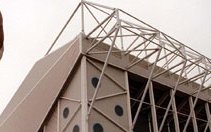The Times:
Thirty-five years ago he was a talented, oft-maligned goalkeeper for Leeds United. He turned informer and some of his team-mates have never spoken to him since. Even his best man washed his hands of the whistle-blower. The truth hurts.
Sprake’s crime was to confirm parts of a tabloid investigation into allegations that Don Revie, the Leeds manager, had offered bribes to opposing players. The evidence of match-fixing is now overwhelming, Frank McLintock recently adding his voice by revealing that he had once been promised a holiday anywhere in the world as a guest of Leeds if Arsenal took it easy one afternoon.
Yet some Leeds players are still bitter that an insider told the truth. Eddie Gray, Allan Clarke, Mick Jones and David Harvey were among those who closed ranks. Some will not even speak Sprake’s name. When his career ended prematurely after an operation involving a hacksaw and an embolism that stopped his heart for 30 seconds, nobody visited. Last month, a piece on him in the club magazine was pulled. The attitude says much about football’s insularity.
?It is sad the way it all ended and I’ve got nothing against any of them,? Sprake said. ?But what is disappointing is the FA did not use the evidence to clean up football once and for all. The trouble is it’s difficult to prove anything.?
The FA now wants a dodgy manager or rogue agent suddenly to come clean over the open secret of bungs. It will be a long wait. Why would anyone rush to back Mike Newell when they can look at Sprake’s ostracism? ?I didn’t do it for money and the Mirror already had the facts and were going to print the story when they came to me,? Sprake said.
He maintains that the only betrayal came from Revie, who reneged on a promise of a testimonial when Sprake left for Birmingham City in 1973. ?I phoned him many times but he never returned my calls,? he said. Only when Revie got wind of the Mirror’s investigation into his methods did he pick up the phone to offer Sprake a testimonial and a job with Admiral Sports. ?I would have got far more money, well over £20,000, from a testimonial than I got from my minor part in the Mirror story,? he said to debunk any allegations of greed.
In the interim years, Sprake has seen his reputation tarnished, with revisionists painting him as an error-prone goalkeeper with a short fuse. The latter is certainly true, although he cannot remember Gray’s claim that he once picked up Harvey, his rival, and hung him on a coat peg. ?We were a happy family then,? he said. ?I remember David coming in the day his pet monkey committed suicide. It had put its head in the oven.
David was crying his eyes out and, of course, we burst out laughing.? Finally, after 30 years of hurt, Sprake was reconciled with Gray in a Leeds radio studio on Friday.
It took the prompting of his nephew and co-author, Stu Sprake, a lecturer in social policy at Swansea College, to convince him to do a book. The title, Careless Hands ? The Forgotten Truth Of Gary Sprake, evinces the need to put the record straight.
Goalkeepers are marked by their errors and Sprake’s most famous is legendary. It was December 9, 1967, when he threw the ball into his own net at Anfield, the Tannoy announcer played Des O’Connor’s Careless Hands at the interval and an anti-hero was born. Neutrals do not recall the wonder saves against Ferencvaros when Leeds won the Inter-Cities Fairs Cup in 1968 or the fact ?I made half a dozen mistakes in 600 games?.
Nor can they explain why, if Sprake was so suspect, he received so many cortisone injections. ?They went to a lot of effort to get me fit considering I was such a poor keeper,? he said. ?I had injections maybe every week. It was widespread back then. I think it rots your bones. I’ve bad arthritis now, like a lot of old players, and have had a lot of pain-killing injections in my back and fingers. Was it the cortisone? The PFA were supposed to be investigating it but I’ve never heard anything.?
On the way back from a match against QPR, Sprake remembers being doubled up in pain. He needed an operation on his back to correct a spinal fusion. Complications led to intense pain in his chest and lungs and a blood clot ?that is fatal in 90 per cent of cases?. A top surgeon happened to be passing the hospital and cut open his rib cage. Then they used electric shock treatment to restart his heart. ?I died for a bit,? he said casually. He still has a ten-inch scar.
Now, with the death of Peter Osgood providing intimations of mortality for the stars of the 1970s, this Leeds great hopes his team-mates will agree to mend the deeper wound.
Share this article
